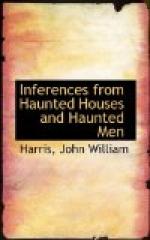[Footnote 15: Ibid., p. 132.]
To turn to another characteristic of the disturbers of the peace at B——, and to illustrate it by comparison. In Mr. Podmore’s book on Psychical research,[16] in the chapter describing phenomena of the Poltergeist order—the Poltergeist in one case was a girl of about twelve, Alice. She, Mrs. B. and Miss B., and Miss K. were seated at a table; it moved sharply and struck Miss K. on the arm. Miss K. was an inmate of the house, and no doubt Alice preferred hitting her to hitting her mother and sister.
[Footnote 16: “Studies,” p. 153.]
Similarly the disturbers at B—— House showed great respect for the press. When a leading Edinburgh editor’s son was there all was quiet; and although they flew at their pet prey the priests, yet a bishop was too imposing for them; and after he had blessed the house from top to bottom, they left it quiet for the remaining week of Miss Freer’s stay.[17]
[Footnote 17: “Alleged Haunting,” p. 215.]
This might be sufficient to lull any further zeal the Catholic regular clergy might find for the matter.
Again the strange fact may be noted that, a gardener coming every night to look after the stoves between 10 and 10.30, no noises were noted at that time, with one exception. The gardener therefore kept the ghosts away.
But the one exception was when a servants’ ball was being given, and the gardener was in the house, in the billiard-room, where the supper was served. To obtain re-hypnotism it was necessary for the disturbers to approach the house. Their object would easily be affected with people already hypnotised in the railway station or train.
These would suffer from fatigue and nervousness, but would put it down to the journey.
The approach to the house with rights of way close by would be very easy. The brave garrison who were so well commanded by Miss Freer, and who, with three or four exceptions, support her account, were generally affected (if well known, and not as Mr. Z., the editor’s son, too dangerous) on the first night of their arrival at B——.
Miss Freer and Miss Moore, her comrade who shared her bedroom during the greater part of the B—— siege, were thus attacked. Mr. L.F. was disturbed, and also Colonel Taylor (in whose name the house was taken, and who was almost impervious to influences), on their first night at B——. Why the Honourable E.F. did not suffer at all is not clear. Perhaps he was left alone on account of his scientific capacities.
Three gentlemen who arrived together were not affected; there is strength in numbers; and whilst people talking to each other are harder to influence for two or three reasons, they further unconsciously watch over each other. Mr. W. stayed two days and heard nothing; his scepticism was convinced later. Mr. MacP. experienced nothing in four nights, but on a later visit heard sounds. Mr. C., an Edinburgh solicitor, heard voices in the glen, on the second occasion of a vision being seen there by Miss Freer, which was during his first visit.




